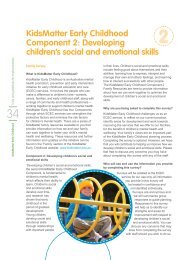KidsMatter Evaluation Final Report - Bspg.com.au
KidsMatter Evaluation Final Report - Bspg.com.au
KidsMatter Evaluation Final Report - Bspg.com.au
- No tags were found...
You also want an ePaper? Increase the reach of your titles
YUMPU automatically turns print PDFs into web optimized ePapers that Google loves.
executive summary<strong>Evaluation</strong> <strong>Final</strong> <strong>Report</strong>Phillip T. Slee, Michael J. Lawson, Alan Russell, Helen Askell-Williams,Katherine L. Dix, L<strong>au</strong>rence Owens, Grace Skrzypiec, Barbara SpearsPhoto: VicHealthCentre For Analysis of Educational FuturesFLINDERS UNIVERSITY 2009
<strong>KidsMatter</strong>: the Australian Primary Schools Mental Health Initiative is developed in collaboration by the Australian GovernmentDepartment of Health and Ageing, beyondblue: the national depression initiative, the Australian Psychological Society, PrincipalsAustralia, with support by Australian Rotary Health.<strong>KidsMatter</strong> information and resources (including electronic copies of this report) are available from www.kidsmatter.edu.<strong>au</strong>.Hard copies of this report can be ordered from www.beyondblue.org.<strong>au</strong> (click Get Information).Suggested Reference:Slee PT, Lawson MJ, Russell A, Askell-Williams H, Dix KL, Owens L, Skrzypiec G, Spears B (2009). <strong>KidsMatter</strong> Primary <strong>Evaluation</strong> <strong>Final</strong> <strong>Report</strong>.Centre for Analysis of Educational Futures, Flinders University of South Australia.© Copyright Beyond Blue Limited December 2009ISBN: 978-0-9807463-0-3
ForewordI am pleased to be writing the foreword to this report on the evaluation of the national pilot of <strong>KidsMatter</strong>: the Australian PrimarySchools Mental Health Initiative. The evaluation shows this initiative has worked wonderfully well - and I’m thrilled that it will beextended to more primary schools and adapted for pre-school children Australia wide.In participating schools, the number of mental health difficulties in students diminished and overall, children experienced improvedmental health and well-being.These findings – together with the positive response <strong>KidsMatter</strong> has received from school <strong>com</strong>munities across Australia – hasconvinced both the Australian Government and beyondblue of the need to continue to support this valuable initiative.Our children are our future. By focusing on their well-being in pre-schools and primary schools, as they’re growing up, they’llunderstand that good mental health is just as important as good physical health.We know <strong>KidsMatter</strong> in schools helps to make kids resilient and gives them the tools they need to deal with problems. We hope theycan build on this strong foundation through adolescence and into adulthood.Children who feel good about themselves and who have good mental health are in a better position to enjoy and benefit fromfriendships, family relationships and learning opportunities.On the other hand, children who don’t feel good about themselves can have a hard time at school in both the playground andthe classroom. If the children’s problems aren’t addressed early and the problems persist – this could lead to them having ongoingdifficulties and fewer opportunities as they mature. The good news is these children can be helped, particularly if we recognise andaddress their problems early.<strong>KidsMatter</strong> was developed to support the mental health and well-being of Australian children by helping schools to implementevidence-based mental health promotion, prevention and early-intervention strategies.<strong>KidsMatter</strong> was strengthened by a very successful collaboration between beyondblue: the national depression initiative, the AustralianGovernment Department of Health and Ageing, the Australian Psychological Society, Principals Australia, and Australian Rotary Health.I <strong>com</strong>mend the <strong>au</strong>thors of this report from the <strong>Evaluation</strong> consortium led by the Centre for the Analysis of Educational Futures atFlinders University, which included staff from The University of South Australia and the Department of Education and Children’sServices, South Australia.Most of all, my congratulations and thanks go to the children, parents and staff of the 101 schools who participated in the <strong>KidsMatter</strong>pilot.This is a fantastic initiative – a world-first by Australia – for which I thank everyone involved and I urge all states and territories to investin their kids’ futures by embracing <strong>KidsMatter</strong>.The Hon. Jeff Kennett ACChairmanbeyondblue: the national depression initiativeNovember 2009Executive Summary 3
<strong>KidsMatter</strong> Executive Summary“What <strong>KidsMatter</strong> does is it actually introduces the notion that social and mental health wellbeing is important at the schoollevel. It actually says to teachers and staff at schools … that … you can actually do it, and this is how you go about it. This is amodel for you to be able to do this and you’ll be able to have some input into it and be able to participate. So <strong>KidsMatter</strong>, I thinkthe importance of it, is changing the thinking of teachers – that they actually have a role to play in children’s social and emotionalwellbeing ….Although they might not be a trained mental health professional, with the resources that <strong>KidsMatter</strong> provide, theyare able to provide guidance as to where they may get that information.” Counsellor School 9The <strong>KidsMatter</strong> Initiative<strong>KidsMatter</strong> (KM) is an Australian national primary school mental health promotion, prevention and early intervention initiative. KM wasdeveloped in collaboration with the Australian Government Department of Health and Ageing, beyondblue: the national depressioninitiative, the Australian Psychological Society, and Principals Australia, and was supported by the Australian Rotary Health Research Fund.<strong>KidsMatter</strong> uses a whole-school approach. It provides schools with a framework, an implementation process, and key resources todevelop and implement evidence-based mental health promotion, prevention and early intervention strategies. The KM frameworkconsists of four key areas, designated as the KM <strong>com</strong>ponents:1. Positive school <strong>com</strong>munity2. Social and Emotional Learning for students3. Parenting support and education4. Early intervention for students experiencing mental health difficulties.<strong>KidsMatter</strong> aims to:• improve the mental health and well-being of primary school students• reduce mental health difficulties amongst students• achieve greater support for students experiencing mental health difficulties.<strong>KidsMatter</strong> impact overview“[<strong>KidsMatter</strong>] has changed school culture, I think. It’s changed the way the school views mental health. It’s given a greaterawareness, but it’s also changed the way, I think, people relate to one another – particularly the students, and the way theclassrooms operate.” Principal School 9There were positive changes to schools, teachers, parents/caregivers 1 , and children associated with KM over the two year trial.• There was evidence of change related to all four <strong>com</strong>ponents of the KM framework.• <strong>KidsMatter</strong> was associated with statistically and practically significant 2 improvement in students’ measured mental health, in terms ofboth reduced mental health difficulties and increased mental health strengths.• The impact of KM was more apparent for students who were rated as having higher levels of mental health difficulties at the start ofthe trial.• There was substantial similarity in the findings for schools formally involved in KM for one year and for schools formally involved overtwo years. However, there were some measures that showed stronger effects in the schools involved in KM for two years.Background to the <strong>KidsMatter</strong> <strong>Evaluation</strong>A Pilot Phase of KM was trialled in 100 3 schools across Australia during 2007-2008. Fifty of the schools ran KM during the 2007 and2008 school years. The remaining schools undertook KM during the 2008 school year. A consortium based in the Centre for Analysis ofEducational Futures at Flinders University undertook an evaluation of the two-year trial.1 For simplicity, the term ‘parent’ rather than ‘parent or caregiver’ is used throughout this report, but is intended to be inclusive of both parents and caregivers.2 The more rigorous significance level of 0.01 was chosen, to take into account multiple <strong>com</strong>parisons. Effect size was based on a regression coefficient equivalent to a part correlation with 0.10,0.24, and 0.37 as indicative of the cut points between very small, small, medium and large, respectively (Kirk, 1996). Small, medium and large effect sizes indicate changes that are of practicalsignificance. In each case these reported practical effect sizes were associated with statistical significance.3 The trial of KM was originally intended for 101 schools, but one school did not participate in the evaluation due to the challenges of a high proportion of transient students in a longitudinal study.4 <strong>KidsMatter</strong> Evalutaion <strong>Final</strong> <strong>Report</strong>
The evaluation examined the impact of KM on schools, teachers, parents and students. Teachers and parents of students (targetage of 10 years) were surveyed during 2007 and 2008. Most items on the questionnaire required responses on a 7-point Likert scalefrom ‘strongly disagree’ (1) to ‘strongly agree’ (7). Special emphasis was placed on the impact of KM on student mental health. Mentalhealth was measured to include both strengths and difficulties, with the main measure being the internationally used Strengths andDifficulties Questionnaire (SDQ), designed by Goodman (2005).The surveys covered student mental health, engagement with, and implementation of KM, and influences on schools, teachers,parents and students. Survey responses were gathered on four occasions from teachers and on three occasions from parents, for upto 76 students per school. The first survey was <strong>com</strong>pleted by the parents and teachers of 4980 students.The information available in the evaluation also included qualitative data provided in:• reports from KM Project Officers who worked with each of the Pilot schools in the implementation of KM• interviews and focus group discussions conducted with school leaders, teachers, parents and students in 10 schools in the latterpart the KM trial• summaries of the processes and effects of KM within their schools provided by principals and KM action team leaders at the endof the trial.Statements about impact and change over time generated from the surveys are based on quantitative analyses and refer to resultsthat are statistically significant and also of practical significance. Findings from the analysis of qualitative data following analysis inrelation to the main themes and requirements of the evaluation are also presented at relevant points.Impact of <strong>KidsMatter</strong> on schools and teachersIn general, schools adopted KM and actively worked at its implementation.• Schools, teachers and parents increasingly became engaged with KM. This increased engagement was statistically significant andrepresented a large practical effect size. The increased engagement is illustrated by the fact that, at the start of the evaluation 35% ofteachers strongly agreed (scored 6 or 7) that schools were engaged with KM, whereas by the end of the evaluation, 57% of teachersmade such ratings. That is, 22% more teachers strongly agreed.• By the end of the evaluation, 26% more teachers strongly agreed that schools were using the ‘7-Step’ implementation process.• Over the course of the trial, most progress was made on implementing Component 2: Social and Emotional Learning for students,and least progress was made on Component 3: Parenting Support and Education and Component 4: Early intervention for students.A closer examination of the data revealed differences in the degree of implementation across schools. According to Project Officers’reports, high implementation schools:• paid more attention to the prescribed 7-Step implementation process• displayed a higher level of involvement of all stakeholders, including the active involvement of the school leadership team.Although there were some difficulties and barriers to the implementation of KM, such as lack of available time in school timetables,there were positive reports about the impact of KM from stakeholders, including effects such as:• facilitating the placement of mental health as an issue onto schools’ agenda• providing a conceptual framework for considering mental health issues• providing a <strong>com</strong>mon language that enabled school <strong>com</strong>munities to work on these issues• making an impact on school culture, which facilitated the raising of issues related to mental health and child development.<strong>KidsMatter</strong> professional developmentTeachers were generally positive about the professional development delivered in KM. The effectiveness of the PD assessed at the endof the trial was highlighted by the finding that 60% of the teachers strongly agreed that the professional development had increasedtheir <strong>com</strong>mitment to promoting student wellbeing, and better equipped the school to address the four <strong>com</strong>ponents.The four <strong>KidsMatter</strong> ComponentsA major emphasis in KM was on the four <strong>com</strong>ponents of the framework as the foundation for effecting change in student mental health.There was evidence of improvement in schools’ performance associated with each <strong>com</strong>ponent, although not all <strong>com</strong>ponents improvedto the same extent. There was more evidence of positive change in the ratings from teachers than in the ratings from parents.Executive Summary 5



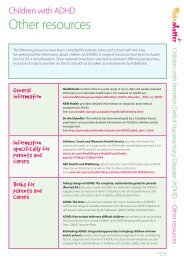
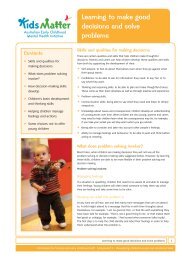
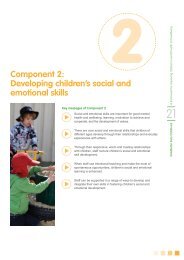
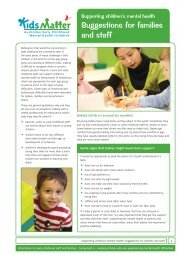
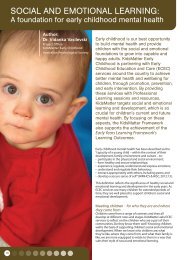
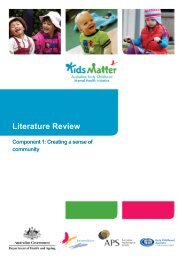
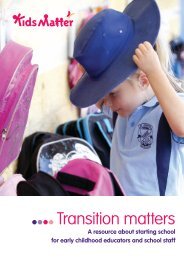
![Trinity Anglican School - Cairns story [378KB]pdf - KidsMatter](https://img.yumpu.com/41716076/1/184x260/trinity-anglican-school-cairns-story-378kbpdf-kidsmatter.jpg?quality=85)
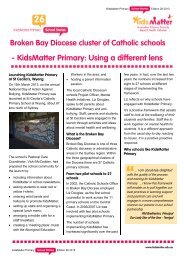
![Happy families work together [327KB] PDF - KidsMatter](https://img.yumpu.com/40767384/1/184x260/happy-families-work-together-327kb-pdf-kidsmatter.jpg?quality=85)
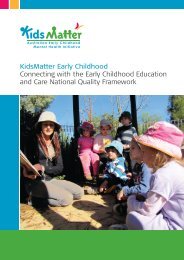
![Action Team Handbook 2012 [1.9M] [PDF] - KidsMatter](https://img.yumpu.com/38050920/1/184x260/action-team-handbook-2012-19m-pdf-kidsmatter.jpg?quality=85)
![[1008KB]pdf - KidsMatter](https://img.yumpu.com/38050895/1/184x260/1008kbpdf-kidsmatter.jpg?quality=85)
